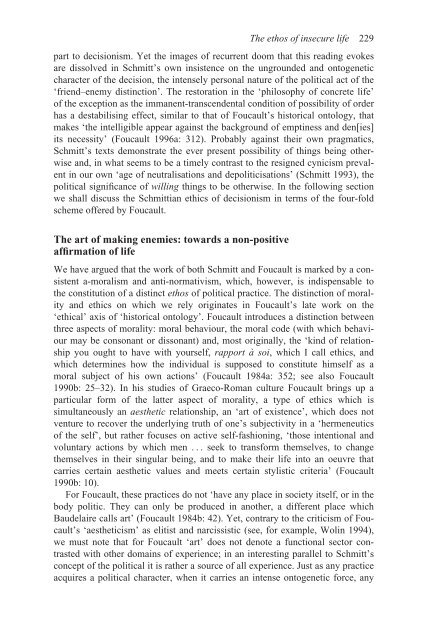The International Political Thought of Carl Schmitt: Terror, Liberal ...
The International Political Thought of Carl Schmitt: Terror, Liberal ...
The International Political Thought of Carl Schmitt: Terror, Liberal ...
Create successful ePaper yourself
Turn your PDF publications into a flip-book with our unique Google optimized e-Paper software.
part to decisionism. Yet the images <strong>of</strong> recurrent doom that this reading evokes<br />
are dissolved in <strong>Schmitt</strong>’s own insistence on the ungrounded and ontogenetic<br />
character <strong>of</strong> the decision, the intensely personal nature <strong>of</strong> the political act <strong>of</strong> the<br />
‘friend–enemy distinction’. <strong>The</strong> restoration in the ‘philosophy <strong>of</strong> concrete life’<br />
<strong>of</strong> the exception as the immanent-transcendental condition <strong>of</strong> possibility <strong>of</strong> order<br />
has a destabilising effect, similar to that <strong>of</strong> Foucault’s historical ontology, that<br />
makes ‘the intelligible appear against the background <strong>of</strong> emptiness and den[ies]<br />
its necessity’ (Foucault 1996a: 312). Probably against their own pragmatics,<br />
<strong>Schmitt</strong>’s texts demonstrate the ever present possibility <strong>of</strong> things being otherwise<br />
and, in what seems to be a timely contrast to the resigned cynicism prevalent<br />
in our own ‘age <strong>of</strong> neutralisations and depoliticisations’ (<strong>Schmitt</strong> 1993), the<br />
political significance <strong>of</strong> willing things to be otherwise. In the following section<br />
we shall discuss the <strong>Schmitt</strong>ian ethics <strong>of</strong> decisionism in terms <strong>of</strong> the four-fold<br />
scheme <strong>of</strong>fered by Foucault.<br />
<strong>The</strong> art <strong>of</strong> making enemies: towards a non-positive<br />
affirmation <strong>of</strong> life<br />
<strong>The</strong> ethos <strong>of</strong> insecure life 229<br />
We have argued that the work <strong>of</strong> both <strong>Schmitt</strong> and Foucault is marked by a consistent<br />
a-moralism and anti-normativism, which, however, is indispensable to<br />
the constitution <strong>of</strong> a distinct ethos <strong>of</strong> political practice. <strong>The</strong> distinction <strong>of</strong> morality<br />
and ethics on which we rely originates in Foucault’s late work on the<br />
‘ethical’ axis <strong>of</strong> ‘historical ontology’. Foucault introduces a distinction between<br />
three aspects <strong>of</strong> morality: moral behaviour, the moral code (with which behaviour<br />
may be consonant or dissonant) and, most originally, the ‘kind <strong>of</strong> relationship<br />
you ought to have with yourself, rapport à soi, which I call ethics, and<br />
which determines how the individual is supposed to constitute himself as a<br />
moral subject <strong>of</strong> his own actions’ (Foucault 1984a: 352; see also Foucault<br />
1990b: 25–32). In his studies <strong>of</strong> Graeco-Roman culture Foucault brings up a<br />
particular form <strong>of</strong> the latter aspect <strong>of</strong> morality, a type <strong>of</strong> ethics which is<br />
simultaneously an aesthetic relationship, an ‘art <strong>of</strong> existence’, which does not<br />
venture to recover the underlying truth <strong>of</strong> one’s subjectivity in a ‘hermeneutics<br />
<strong>of</strong> the self’, but rather focuses on active self-fashioning, ‘those intentional and<br />
voluntary actions by which men . . . seek to transform themselves, to change<br />
themselves in their singular being, and to make their life into an oeuvre that<br />
carries certain aesthetic values and meets certain stylistic criteria’ (Foucault<br />
1990b: 10).<br />
For Foucault, these practices do not ‘have any place in society itself, or in the<br />
body politic. <strong>The</strong>y can only be produced in another, a different place which<br />
Baudelaire calls art’ (Foucault 1984b: 42). Yet, contrary to the criticism <strong>of</strong> Foucault’s<br />
‘aestheticism’ as elitist and narcissistic (see, for example, Wolin 1994),<br />
we must note that for Foucault ‘art’ does not denote a functional sector contrasted<br />
with other domains <strong>of</strong> experience; in an interesting parallel to <strong>Schmitt</strong>’s<br />
concept <strong>of</strong> the political it is rather a source <strong>of</strong> all experience. Just as any practice<br />
acquires a political character, when it carries an intense ontogenetic force, any
















